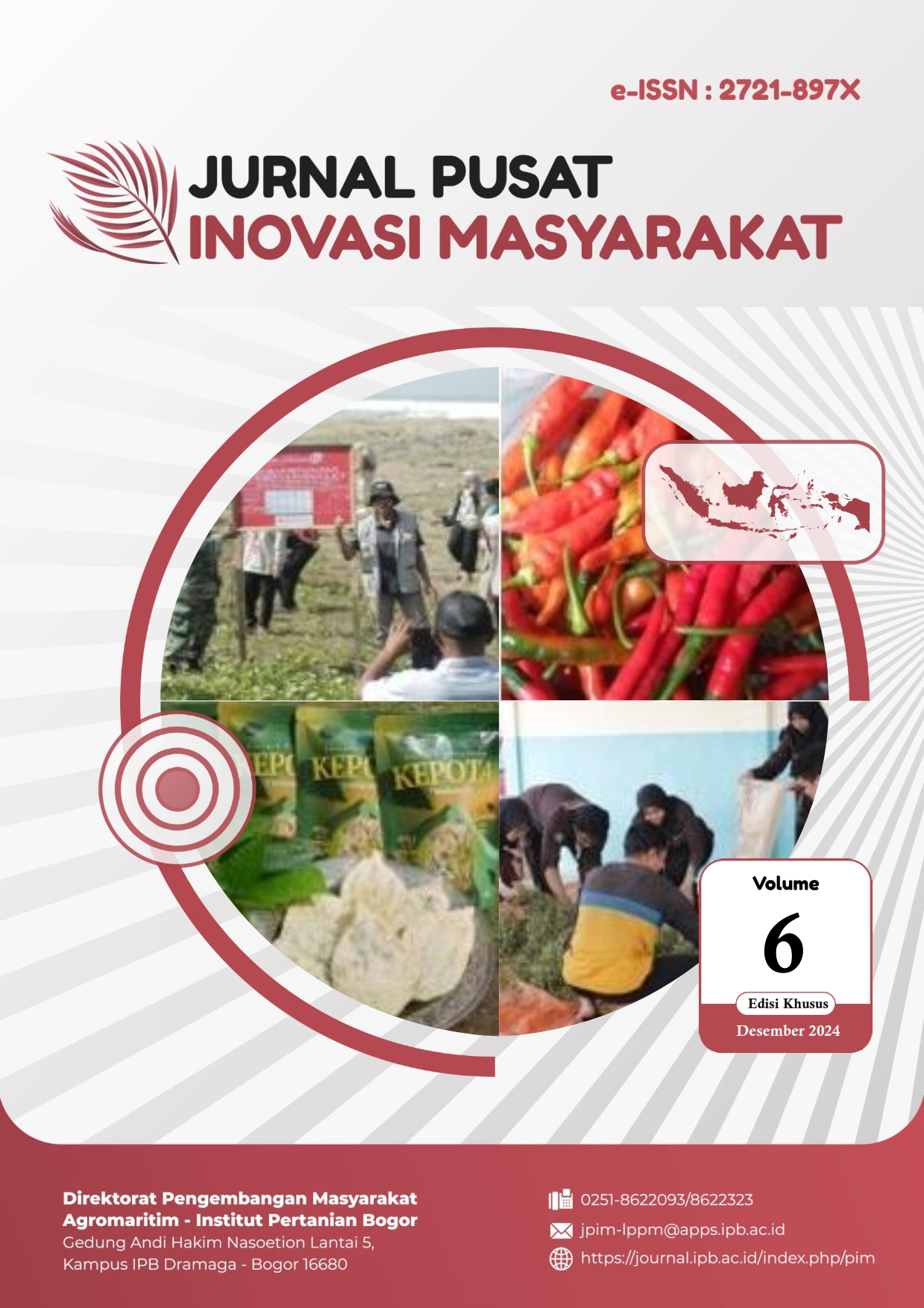Pelatihan Pembuatan Sabun Transparan dan Legalitas Usaha dalam Program UMKM Level Up di Desa Lerep
Abstract
Lerep Village, located at the foot of Mount Ungaran, West Ungaran District, Semarang Regency, has transformed into a tourist village. One of the important pillars in supporting the progress of tourist villages is the growth of competitive MSMEs. MSME players in Lerep Village experience difficulties in developing product innovations and do not yet have business legality so that their marketing reach has not expanded and product sales levels tend to stagnate. The method of implementing innovation includes socialization, interviews, discussions, and mentoring with a descriptive analysis approach. The data sources used are primary data, namely MSME players in Lerep Village and GenBI administrators of Semarang State University, as well as secondary data in the form of relevant literature studies. The results of this service show that the training program on transparent soap making and business legality has enabled MSMEs in Lerep Village to develop varied product innovations and official licenses so that they can attract more tourists and expand their market share. This has an impact on increasing income and welfare for MSME players in Lerep Village. The Level Up MSME program experienced several obstacles in its implementation, such as the low participation rate of participants, the fact that many MSME players are not technologically literate, and the minimal participation of the younger generation in entrepreneurship. Program sustainability efforts are carried out through further assistance so that Lerep Village MSME products can be of higher quality and competitive with other products.
Downloads
References
Asnaini SW, Hartati R, Hulu P, Simorangkir YN, Sudiyono RN, Radita FR. 2022. Sosialisasi Pembuatan Nomor Induk Berusaha (NIB) untuk Pengembangan UMKM di BUMDes Serdang Tirta Kencana Melalui Online Single Submission. MULIA (Jurnal Pengabdian kepada Masyarakat). 1(2): 73–83. https://doi.org/10.56721/mulia.v1i2.86
Esariti L, Nida RS, Rakhmatulloh AR, Sunarti S, Damayanti M, Manullang OR, Anggara DB. 2023. Optimalisasi Pengembangan Desa Wisata Lerep Kabupaten Semarang Berbasis Kearifan Lokal. Journal of Regional and Rural Development Planning (Jurnal Perencanaan Pembangunan Wilayah dan Perdesaan). 7(1): 107–117. https://doi.org/10.29244/jp2wd.2023.7.1.107-117
Febriana H, Andita KV, Rismarina RA, Maulana A. 2023. Peluang Bisnis Digital di Indonesia pada Era Society 5.0. Jurnalku. 3(3): 365–374. https://doi.org/10.54957/jurnalku.v3i3.595
Khuzaimah S. 2018. Pembuatan Sabun Padat dari Minyak Goreng Bekas Ditinjau dari Kinetika Reaksi Kimia. Ratih: Jurnal Rekayasa Teknologi Industri Hijau. 2(2): 1–11.
Maksudi M, Bahrudin B, Nasruddin N. 2023. Faktor-faktor yang Mempengaruhi Sertifikasi Halal dalam Upaya Pemenuhan Kepuasan Konsumen. Jurnal Ilmiah Ekonomi Islam. 9(1): 825–840.
Manteiro MCB. 2017. Model Pengembangan Desa Wisata Berbasis Kearifan Lokal Sebagai Strategi Pengentasan Kemiskinan di Kabupaten Rote Ndao Nusa Tenggara Timur. Bisman-Jurnal Bisnis dan Manajemen. 2(02): 93–101.
Pujiantoro N, Rofiuddin M. 2022. Strategi Digital Marketing dalam Pengembangan Usaha Mikro Kecil Menengah (UMKM) di Desa Bringin Kecamatan Montong Kabupaten Tuban. Widya Cipta: Jurnal Sekretari dan Manajemen. 6(2): 168–175. https://doi.org/10.31294/widyacipta.v6i2.12754
Ramadhani AS, Dewi HDM, Qawiyyu RA, Chusen A, Diana L. 2022. Pendampingan Sertifikasi Halal dan NIB bagi UMKM di Kelurahan Tanjungsari, Sukorejo, Kota Blitar. KARYA: Jurnal Pengabdian kepada Masyarakat. 2(3): 30–35.
Sekarwati E, Hidayah M. 2022. Pendampingan dan Sosialisasi Pendaftaran Sertifikasi Halal Menggunakan Aplikasi Sihalal bagi Pelaku UMKM Kabupaten Purworejo. Jurnal Pengabdian Masyarakat Intimas (Jurnal INTIMAS): Inovasi Teknologi Informasi dan Komputer untuk Masyarakat. 2(2): 84–89. https://doi.org/10.35315/intimas.v2i2.9010
Sugiyono. 2021. Metode Penelitian Kuantitatif, Kualitatif, dan R & D. Bandung (ID): Alfabeta.












